Hydroponic growing in Nigeria is all but easy. This has mainly to do with the fact that the necessary equipment is quite tough to find, and the same goes with regard to quality inputs and specialized labor. Yet, that didn’t stop Christian Nwolisa from pursuing his dream. And thus, he founded Gycon Integrated. “We grow all kinds of crops,” he says. “All kinds of leafy greens such as stevia, but also tomatoes, and bell peppers. Currently, we are focusing on bell peppers.”
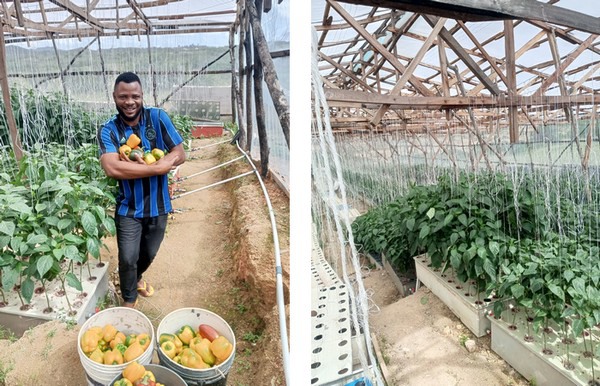
Christian comes from a family of farmers and saw firsthand the hardship of crop seasonality. He was certain that the best way to grow was with hydroponics in a CEA setting, but it was more easily said than done. “In Nigeria, there isn’t a lot of good equipment, and the little there is, is very expensive,” he points out. “On top of that, even if you do have it, you need a power supply, and that is one major challenge in Nigeria.” The reason is twofold: on the one hand, the power supply is oftentimes inconsistent; on the other hand, assuming one gets that consistently, the price is insanely high. “So, you have to improvise and find ways to do it more cheaply.” And that’s exactly what Christian did with Gycon Integrated.
Because of the aforesaid difficulties, Christian had to do it all by himself, from scratch. The greenhouse currently spans over 3,000 square meters and is equipped with a unique hydroponic system Christian built himself. “The first thing I had to find a solution for was the water supply, of course,” he explains. So, he built two plastic tanks, one with reservoir water and one with nutrient water. Through a pipe system, the latter tank is connected to the greenhouse. “Hydroponics is beneficial in that it allows you to save a lot of water as it recirculates.” For this, Christian took advantage of the incline on the greenhouse floor.
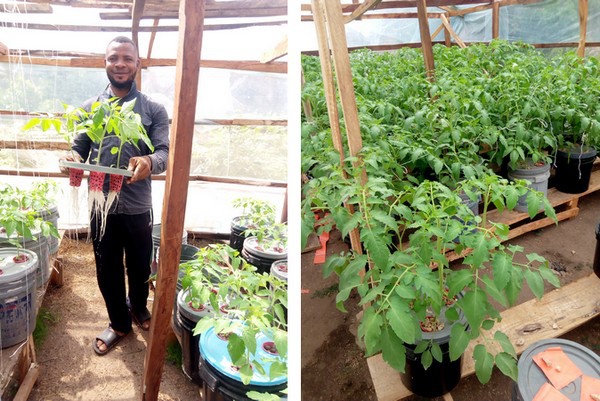
Bell pepper plants are placed in trays, allowing the roots to be suspended in the water. Pipes coming from the nutrient water are connected to the first row of trays. When the water reaches a certain height in the trays, it starts flowing on the other tray rows. Eventually, all the trays receive the same amount of water. “I basically built myself an ebb and flow system, exploiting the incline in the greenhouse room to allow the water to better circulate in every tray, without the need of using power.”
Such a system has to of course take into account waterborne pathogens, and Christian says that this is quite a challenge in Nigeria. Yet, he found a solution for that too. “The most important principle is to always test, test, and test the water so that we can prevent any outbreaks from happening, rather than reacting to it,” he points out. “If we detect something, we get rid of all the water and clean the trays, top to bottom. At the same time, I usually reduce the water pH to a very low level, like 3 or 4. Because of the high acidic content, most, if not all, of the most dangerous waterborne diseases here in Nigeria don’t survive. I let low pH-water sit like that for a night, and then I adjust the pH back to 7 first thing in the morning.”
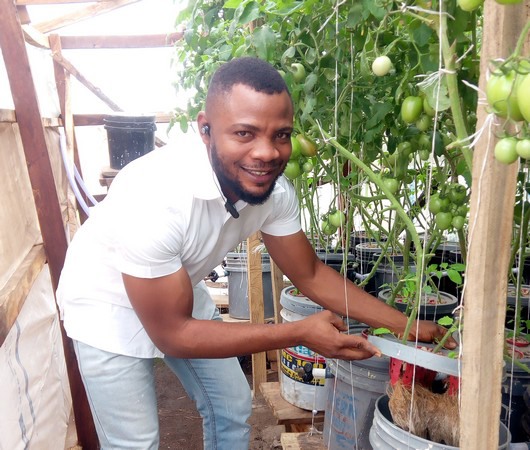
On top of all of that, Christian has also installed a biogas digester to convert compost into gas. “You can put any type of organic waste into it, and it would turn it into gas,” Christian says. “One of the byproducts of this process is a very powerful, pure organic nutrient.”
Christian is one of the few, if not the only hydroponic grower in Nigeria, and this allows him to have an advantage over other farmers. “We grow anything that is in high demand, regardless of the season,” he says. “For instance, right now, bell peppers are very lucrative. That’s why we are growing them. At the same time, every season, once rains begin, the cost of tomatoes skyrockets. This is because tomatoes are grown in open fields, and with heavy rains, a lot of crops get damaged. So, once we are done with our bell peppers, we most likely are going to switch to tomatoes. If we don’t do that, we may grow cucumbers or purple cabbage.”
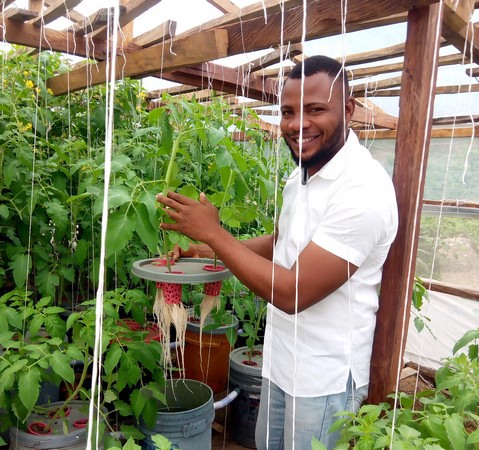
As said, being an early adopter of hydroponics in Nigeria, Christian has a lot of work to do because of the lack of specialized labor. That is also why he trains people in hydroponics at his farm for free. “We had a vision, and that’s why we bought this land and got into this business,” he points out. “As demand keeps coming, we will keep expanding our greenhouse and offering.”
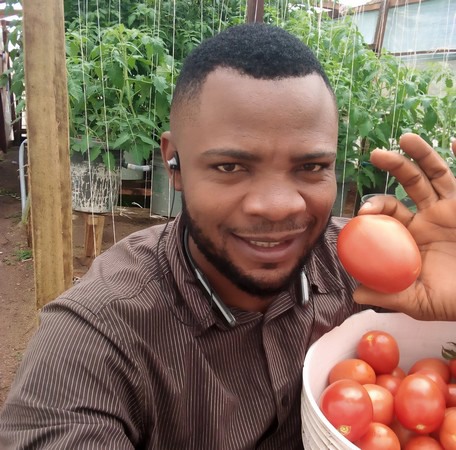
For more information: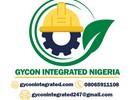
Gycon Integrated
[email protected]
www.m.facebook.com/people/Gycon-Integrated
www.gyconintegrated.com
